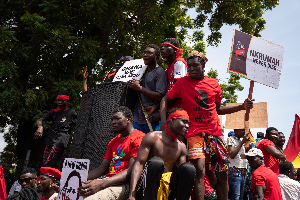 Does music help with protests or do they take away the seriousness of them?
Does music help with protests or do they take away the seriousness of them?
GhanaWeb Feature by: Isaac Dadzie
As much of Africa watches Kenya grapple with a series of protests over an intended finance bill, one prevalent feature in Ghanaian protests stands out: music.
A glance through videos of major protests in Ghana over the past few years reveals a recurring spectacle: trucks loaded with loudspeakers blaring music, delighting the protesters. This leads to an intriguing question: is music during protests necessary?
While there is a case for the relevance of music in political and national discourse and the contributions of the creative arts to political climates, let's focus on the use of music specifically during protests.
Music is essential for setting the mood of social gatherings. It can inspire individuals at the gathering to take action or to relax. Protests, inherently about action, involve groups of concerned individuals airing their grievances to those in authority.
Merging these two elements—protests and music—can create a powerful dynamic. Throughout history, various songs have become protest anthems, with protesters chanting slogans and singing revolutionary songs. So, bringing speakers to protests might seem like a no-brainer. In Ghana, it's a common practice. However, the music played is not typically protest anthems but rather 'feel-good' party music designed to make people dance and put them in a good mood.
This choice of music can be counterproductive. Instead of stoking the fire within the protesters, it often ends up tickling their legs, making the protest feel more like a party. This may reflect a broader issue with how protests in Ghana are organized.
Consider some major protests in Ghana, like #KumiPreko Reloaded, #OccupyJulorBiHouse, #DumsorMustStop, and #HandsofourHotels. They often felt performative. What's the point of a protest if it looks more like a fanfare? Where are the long chants, the angry faces ready to defy authority, and the people prepared to invade government seats? Instead, we see painted faces, branded T-shirts, well-designed placards, and happy music, making the protests resemble street carnivals more than serious demonstrations.
This approach might be why these protests haven't elicited significant responses from the government. As one protester at the #OccupyJulorBiHouse demonstration in 2023 remarked, "For me, it made it fun. But generally, it gave it a vibe of a young people hangout because the songs were not particularly thematic. They could have been war songs, songs about revolution, about black struggle, about unity, etc. But the songs were all about and not particularly thematic."
This doesn't mean music at protests is inherently bad, but maybe playing a Fela or Bob Marley song would have a better effect than playing a Kuami Eugene song. Or perhaps it's better to forgo the speakers altogether, letting those in authority feel the heat, energy, and tension in the air.
Looking at various protests worldwide, such as the Arab Spring protests in 2011, the Black Lives Matter protests in 2020, the End SARS protests in 2020, the Hijab protests in Iran in 2024, and the recent Kenya protests in 2024, we see that these were not well-planned, smooth-sailing events. They exposed the sentiments and frustrations of the masses without involving content creators dancing in the rain.